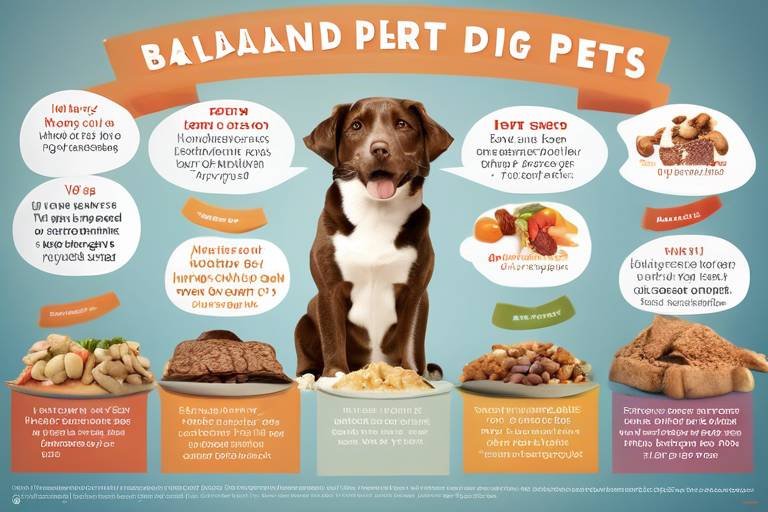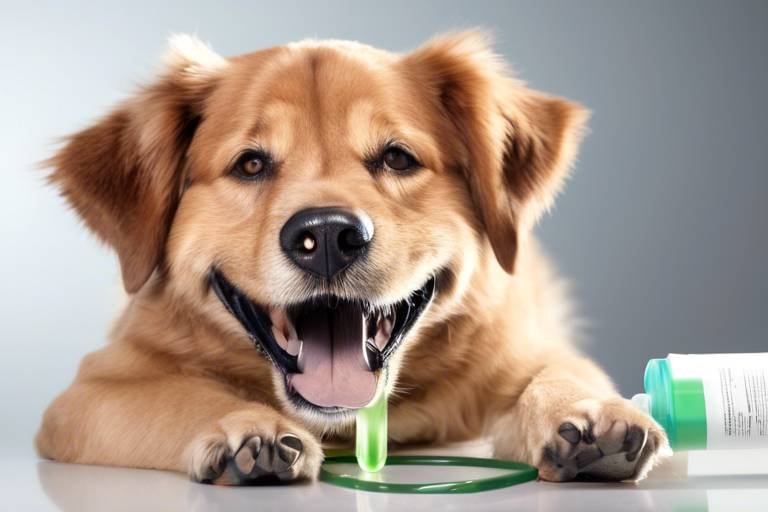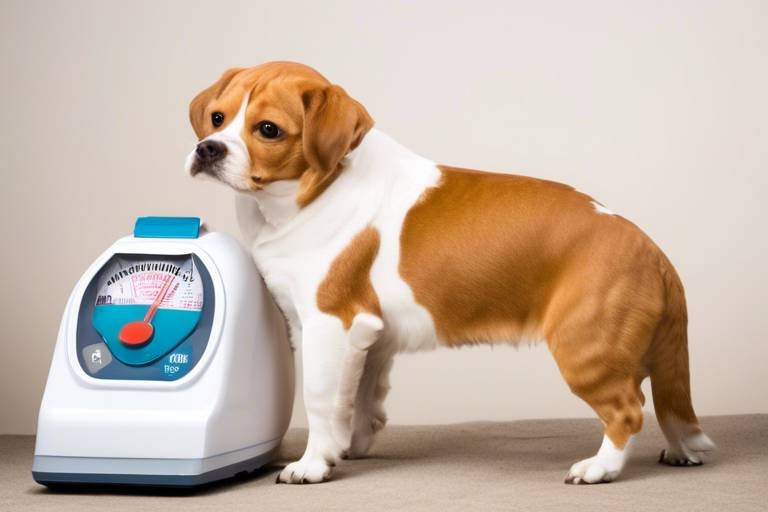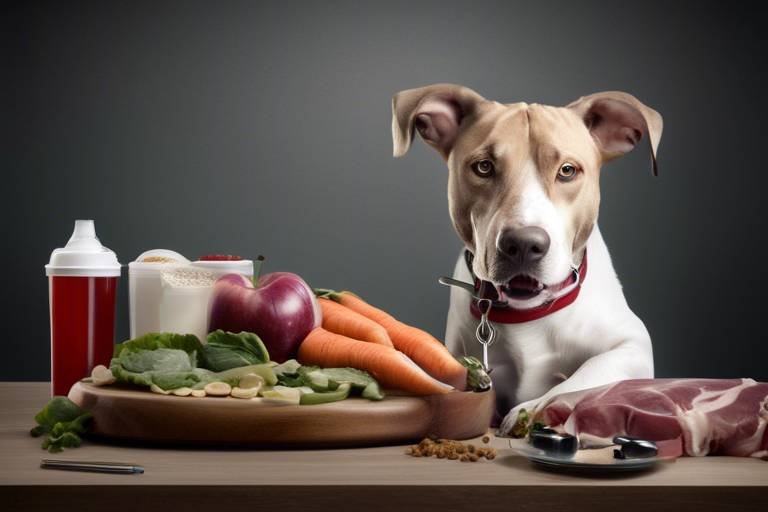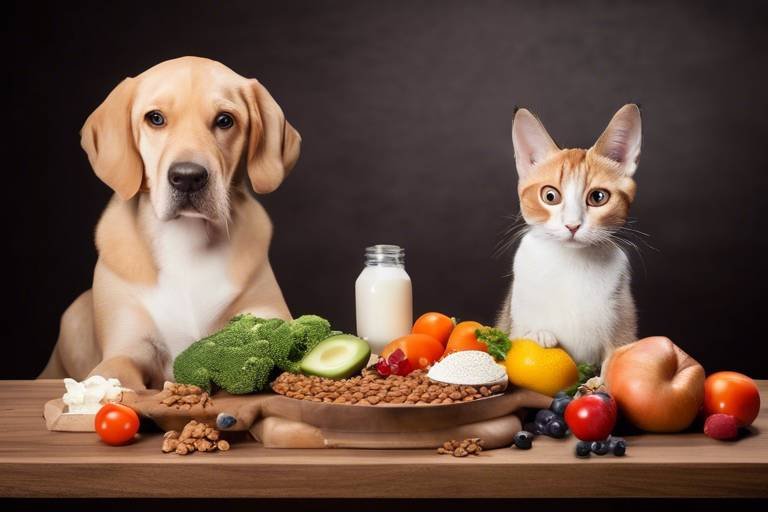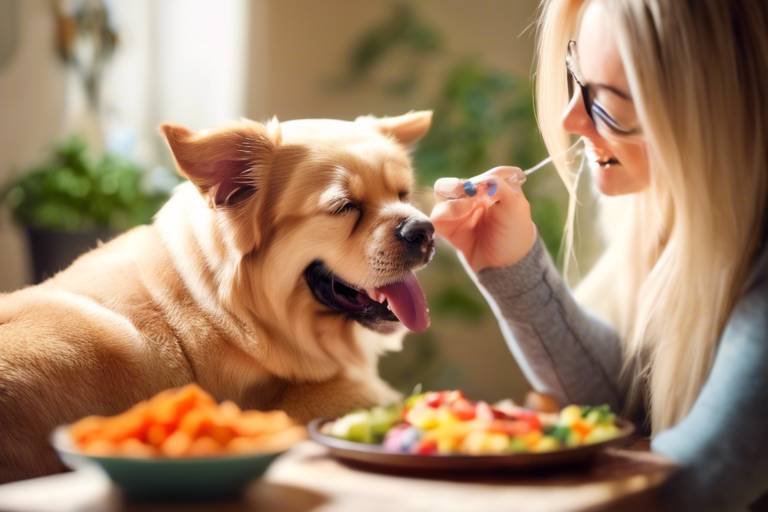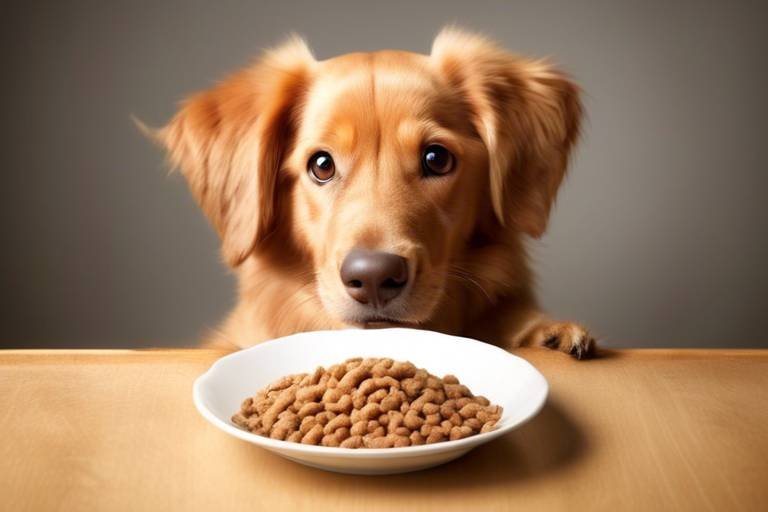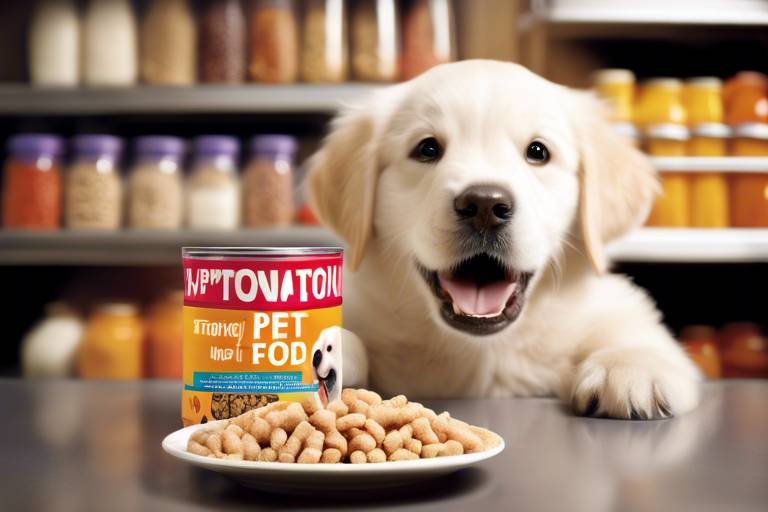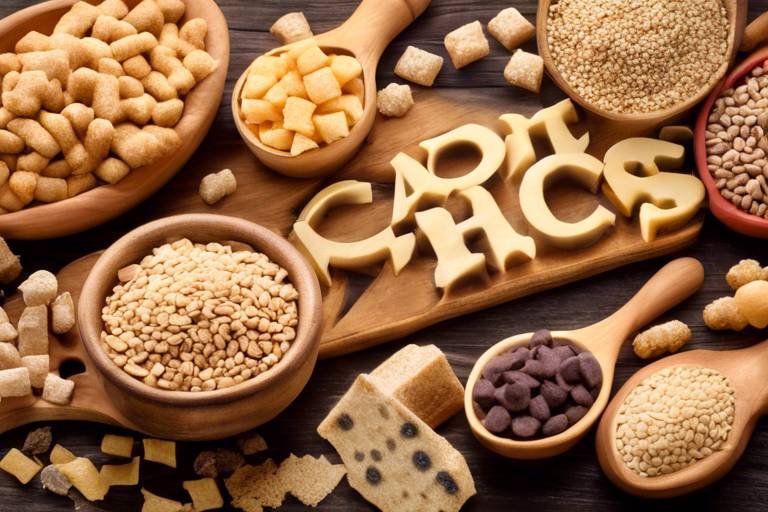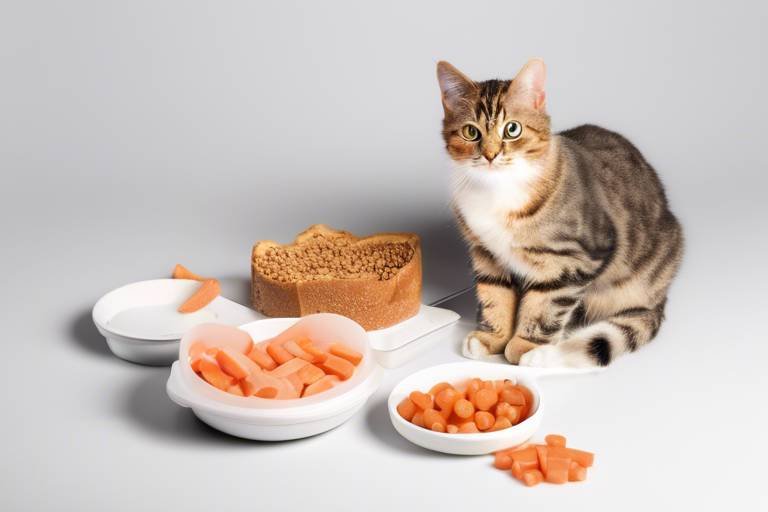The Benefits of a Balanced Diet for Pets
When it comes to our beloved furry companions, ensuring they receive a balanced diet is one of the most vital aspects of responsible pet ownership. Just as we understand the importance of nutrition in our own lives, the same principles apply to our pets. A balanced diet not only fuels their bodies but also plays a significant role in their health, longevity, and overall well-being. Think of it this way: just like a well-tuned engine runs smoothly, a pet that receives the right mix of nutrients will thrive, exhibiting energy and vitality throughout their life.
The foundation of a balanced diet for pets includes a harmonious blend of proteins, fats, carbohydrates, vitamins, and minerals. Each of these nutrients serves a unique purpose. For instance, proteins are essential for building and repairing tissues, while fats provide energy and support cell growth. Carbohydrates, on the other hand, are the fuel that keeps your pet active and playful. Vitamins and minerals are like the tiny superheroes that help maintain various bodily functions, from immune support to bone health.
However, it's important to note that not all pet foods are created equal. Many commercial pet foods may lack essential nutrients or contain fillers that offer little nutritional value. This can lead to a host of health issues down the line. Therefore, being an informed pet owner means understanding what goes into your pet's food and ensuring it meets their specific needs. Just as we wouldn’t settle for fast food every day, our pets deserve better than subpar nutrition.
In addition to enhancing your pet's quality of life, a balanced diet can help prevent common health problems, such as obesity, diabetes, and heart disease. Imagine how devastating it would be to see your playful pup turn lethargic due to poor nutrition! By providing a well-rounded diet, you not only promote a healthy weight but also fortify their immune system, making them less susceptible to illnesses.
To make it easier for pet owners to understand the components of a balanced diet, here’s a simple breakdown of the essential nutrients:
| Nutrient | Function | Sources |
|---|---|---|
| Proteins | Builds and repairs tissues | Meat, fish, eggs, legumes |
| Fats | Provides energy and supports cell growth | Fish oil, flaxseed oil, chicken fat |
| Carbohydrates | Energy source | Rice, oats, potatoes |
| Vitamins | Supports overall health | Fruits, vegetables, fortified pet foods |
| Minerals | Bone health and metabolic functions | Meat, dairy, greens |
Ultimately, the benefits of a balanced diet for pets extend beyond just physical health. It can lead to better behavior, increased energy levels, and a more vibrant personality. Pets that are well-nourished are often happier and more engaged, making for a more fulfilling relationship between you and your furry friend. So, the next time you fill their bowl, remember that you’re not just feeding them; you’re investing in their future!
- What is the best diet for my pet? A balanced diet that includes proteins, fats, carbohydrates, vitamins, and minerals is ideal. Consult your veterinarian for personalized recommendations.
- How can I tell if my pet is getting a balanced diet? Look for signs of good health such as a shiny coat, healthy weight, and high energy levels. Regular vet check-ups can also help assess their nutrition.
- Are homemade diets safe for pets? While homemade diets can be nutritious, they must be carefully balanced. It's crucial to consult a veterinarian to ensure all nutritional needs are met.
- Should I use supplements for my pet? Supplements can be beneficial, especially if your pet has specific health concerns. Always choose high-quality products and consult your vet before adding them to your pet's diet.
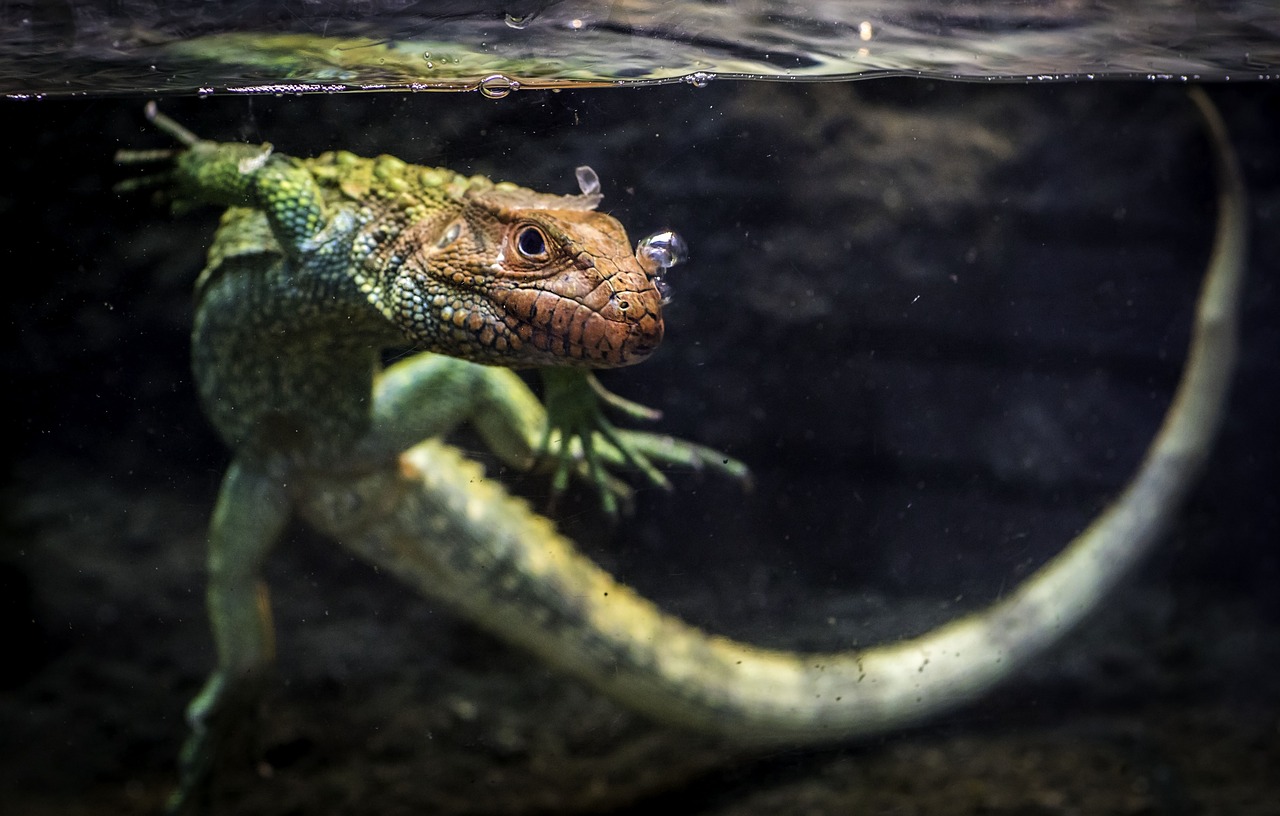
Understanding Pet Nutrition
When it comes to our furry companions, understanding pet nutrition is a fundamental step towards ensuring their health and happiness. Just like humans, pets require a balanced diet to thrive, and this diet should include a variety of essential nutrients. Think of it as a symphony where each nutrient plays a vital role in creating a harmonious and healthy life for your pet. A well-rounded diet encompasses proteins, fats, carbohydrates, vitamins, and minerals, each contributing to your pet's overall vitality.
The role of proteins cannot be overstated; they are the building blocks of your pet's body. Proteins help in building and repairing tissues, making them crucial for growth and maintenance. Without adequate protein, you might notice your pet feeling lethargic or experiencing a decline in muscle mass. On the other hand, fats are essential for providing energy and supporting cell structure. They also play a key role in the absorption of certain vitamins, making them indispensable for your pet’s diet.
Carbohydrates often get a bad rap, but they are a valuable source of energy for pets. They help fuel your pet's daily activities, from chasing their tail to exploring the backyard. However, it’s important to choose the right types of carbohydrates. Whole grains and vegetables are better options compared to processed sugars. Additionally, vitamins and minerals are vital for various bodily functions, including immune support and bone health. A lack of these nutrients can lead to serious health issues, so it’s crucial to include them in your pet's diet.
To make it easier to understand the roles of these nutrients, here’s a quick breakdown:
| Nutrient | Role in Pet Health |
|---|---|
| Proteins | Build and repair tissues, support growth |
| Fats | Provide energy, support cell structure, aid vitamin absorption |
| Carbohydrates | Fuel daily activities, provide energy |
| Vitamins | Support immune function, promote healthy skin and coat |
| Minerals | Support bone health, aid in nerve function |
In summary, a balanced diet is not just about filling your pet's bowl; it's about providing them with the essential nutrients they need to lead a vibrant and healthy life. By understanding the importance of each nutrient, you can make informed decisions about what goes into your pet's food. Remember, just like a well-oiled machine, your pet’s body functions best when all parts are working together smoothly. So, take the time to ensure your furry friend is getting the nutrition they deserve!

Common Nutritional Deficiencies
A balanced diet is not just a luxury for our furry friends; it's a necessity. However, many pet owners unknowingly overlook the importance of proper nutrition, leading to that can significantly impact a pet's health. Just like humans, pets require a variety of essential nutrients to thrive. Without these vital components, they can experience a range of health issues that could have been easily prevented with a well-rounded diet.
One of the most prevalent deficiencies in pets is a lack of protein. Proteins are the building blocks of life, crucial for maintaining muscle mass and overall body function. A deficiency in protein can lead to weakness, lethargy, and in severe cases, organ failure. Similarly, fatty acids are essential for skin and coat health. Pets lacking these nutrients may develop dry skin, flaky fur, and even infections. It's important to note that not all fats are created equal; omega-3 and omega-6 fatty acids are particularly beneficial.
Another common deficiency is vitamin D, which is vital for calcium absorption and bone health. Pets that do not get enough sunlight or consume foods rich in vitamin D can suffer from weak bones and dental problems. Additionally, fiber is often overlooked in pet diets. While it may not seem as critical as other nutrients, fiber is essential for digestive health. A lack of fiber can lead to constipation and other gastrointestinal issues.
To help you better understand these deficiencies, here's a quick overview:
| Nutrient | Common Deficiency Symptoms | Sources |
|---|---|---|
| Protein | Weakness, lethargy, organ failure | Meat, fish, eggs |
| Fatty Acids | Dry skin, flaky fur, infections | Fish oil, flaxseed oil |
| Vitamin D | Weak bones, dental problems | Sunlight, fortified foods |
| Fiber | Constipation, digestive issues | Fruits, vegetables, whole grains |
By being aware of these common deficiencies, pet owners can take proactive steps to ensure their pets are getting the nutrition they need. It's always a good idea to consult with your veterinarian to develop a diet plan that addresses these deficiencies. Regular check-ups can also help catch any nutritional issues before they escalate into more serious health problems.
Q: How can I tell if my pet is lacking essential nutrients?
A: Look for signs such as changes in coat condition, energy levels, and overall behavior. If you notice any unusual symptoms, consult your veterinarian.
Q: Are homemade diets safe for pets?
A: Homemade diets can be safe if they are balanced and meet all of your pet's nutritional needs. However, it is best to consult with a veterinarian or a pet nutritionist before making any significant changes to your pet's diet.
Q: What should I do if I suspect my pet has a nutritional deficiency?
A: Contact your veterinarian immediately. They can perform tests and recommend dietary changes or supplements to address the deficiency.
Signs of Nutritional Deficiencies
Recognizing the signs of nutritional deficiencies in your pet is crucial for ensuring their health and happiness. Just like us, pets require a well-balanced diet to thrive, and when they miss out on essential nutrients, their bodies often send out warning signals. These signs can manifest in various ways, and it’s important to be vigilant and responsive to them.
One of the first things to look for is behavioral changes. If your usually playful pup suddenly seems lethargic or disinterested in their favorite activities, it could indicate a lack of essential nutrients. Similarly, if your cat, typically a curious explorer, becomes withdrawn or irritable, it might be time to evaluate their diet. Nutritional deficiencies can lead to mood swings and decreased energy levels, which can affect their overall quality of life.
Additionally, physical symptoms are often the most noticeable indicators of dietary problems. For instance, a dull or brittle coat can suggest that your pet is lacking in vital fatty acids or vitamins. You might also notice:
- Weight loss or sudden changes in appetite
- Frequent gastrointestinal issues such as diarrhea or vomiting
- Dry or flaky skin, which may indicate a deficiency in essential fatty acids
- Dental problems, like gum disease or bad breath, that can be linked to poor nutrition
It's essential to pay attention to these signs, as they can help you identify nutritional gaps in your pet's diet. If you notice any of these symptoms, it’s advisable to consult with your veterinarian. They can perform tests to determine if your pet is indeed suffering from a deficiency and recommend appropriate dietary adjustments or supplements.
In summary, being proactive about your pet's nutrition is key to preventing deficiencies. By keeping an eye out for behavioral shifts and physical symptoms, you can ensure that your furry friend remains healthy and happy. Remember, a well-nourished pet is a joyful pet!
Q: What are the most common nutritional deficiencies in pets?
A: Common deficiencies include protein, vitamins A, E, and D, omega-3 fatty acids, and minerals like calcium and phosphorus. Each of these plays a vital role in your pet's health.
Q: How can I tell if my pet's diet is balanced?
A: A balanced diet should include proteins, healthy fats, carbohydrates, vitamins, and minerals. Regular check-ups with your veterinarian can help assess your pet's nutritional status.
Q: Are there specific foods that can help prevent nutritional deficiencies?
A: Yes! Foods rich in whole ingredients, such as lean meats, fish, vegetables, and fruits, can help maintain a balanced diet. Always consult your vet for tailored advice.
Q: Can I use supplements to address nutritional deficiencies?
A: Supplements can be beneficial, but they should not replace a balanced diet. Always consult with your veterinarian before introducing any supplements to ensure they are appropriate for your pet's specific needs.
Behavioral Changes
When it comes to our furry companions, their behavior speaks volumes about their health. Just like humans, pets can experience mood swings and behavioral changes when they are not getting the right nutrients in their diet. Imagine feeling sluggish and irritable because you skipped breakfast; your pet feels the same way! A deficiency in essential nutrients can lead to a host of behavioral issues that may leave you scratching your head.
For instance, pets that are lacking in certain vitamins or minerals may become more agitated or anxious. You might notice your dog barking excessively or your cat hiding away more than usual. These changes can be a cry for help, indicating that their dietary needs are not being met. It's crucial to pay attention to these signs, as they can often be linked to nutritional deficiencies.
Additionally, a lack of omega-3 fatty acids, which are vital for brain health, can lead to increased aggression or hyperactivity in pets. Think of omega-3s as the oil that keeps the engine running smoothly. Without it, your pet's behavior can become erratic and unpredictable. Conversely, pets that receive a balanced diet rich in these essential nutrients tend to exhibit more stable and positive behaviors.
Moreover, consider how a balanced diet affects your pet's energy levels. When pets are well-nourished, they are more likely to engage in play and social activities. If your once-active dog suddenly prefers to lounge around all day, it might be time to reassess their diet. A well-rounded meal plan can help restore their energy and enthusiasm for life!
In summary, keeping an eye on your pet's behavior is crucial for identifying potential nutritional deficiencies. By ensuring they receive a balanced diet, you can help support their emotional well-being and maintain a happy, healthy companion. Remember, a happy pet is often a well-fed pet, so don’t overlook the importance of nutrition in their overall behavior!
- What are the signs that my pet may have a nutritional deficiency? Look for changes in behavior, coat quality, energy levels, and weight.
- How can I ensure my pet is getting a balanced diet? Consult with a veterinarian and consider high-quality pet food that meets their specific nutritional needs.
- Are supplements necessary for my pet? Supplements can be beneficial, especially if your pet has specific health issues or dietary restrictions. Always consult a veterinarian before adding them to your pet’s diet.
Physical Symptoms
When it comes to your furry friend's health, can often serve as the first warning signs of nutritional deficiencies. Just like humans, pets can exhibit various physical changes that reflect their internal health. For instance, a dull coat may indicate a lack of essential fatty acids, while sudden weight loss could suggest inadequate caloric intake or a deficiency in vital nutrients. It’s crucial to pay attention to these signs, as they can provide insight into your pet’s dietary needs.
One of the most obvious indicators of poor nutrition is the condition of your pet's coat. A shiny, healthy coat is often a reflection of a balanced diet rich in essential nutrients. If you notice your pet's fur looking lackluster, it might be time to reevaluate their diet. Similarly, weight fluctuations—whether it be unexpected weight gain or loss—can signal underlying nutritional issues. For example, if your pet is losing weight despite eating regularly, it could be a sign that their food lacks the necessary nutrients to support their energy needs.
Other physical symptoms to be aware of include:
- Skin Issues: Dry, flaky skin or excessive itching can indicate deficiencies in fatty acids or other vital nutrients.
- Dental Problems: Bad breath, gum disease, and tooth decay can arise from poor nutrition and a lack of dental care.
- Digestive Issues: Frequent vomiting or diarrhea may suggest that your pet's diet is not suitable for their digestive system.
Additionally, lethargy or a sudden decrease in activity levels can be a red flag. If your pet seems less enthusiastic about playtime or walks, it could be due to a lack of energy from their food. Similarly, unusual behaviors, such as increased irritability or anxiety, can sometimes be traced back to nutritional deficiencies. Just like us, pets need the right balance of nutrients to feel their best both physically and mentally.
In summary, keeping an eye on your pet's physical symptoms is vital. By recognizing these signs early, you can take proactive steps to adjust their diet, ensuring they receive the nutrients they need for a long, healthy life. Remember, a little attention to detail can make a significant difference in your pet's overall well-being.
Q: How can I tell if my pet is getting a balanced diet?
A: Look for signs of good health, such as a shiny coat, healthy weight, and active behavior. Regular veterinary check-ups can also help determine if your pet's diet is meeting their nutritional needs.
Q: What should I do if I notice physical symptoms in my pet?
A: If you observe any concerning symptoms, consult your veterinarian as soon as possible. They can provide guidance on dietary adjustments or recommend specific tests to identify deficiencies.
Q: Are there specific foods that can help improve my pet's coat condition?
A: Foods rich in omega-3 and omega-6 fatty acids, such as fish oil and flaxseed, can greatly enhance coat health. Always consult with your vet before making any significant changes to your pet's diet.
Addressing Nutritional Deficiencies
Addressing nutritional deficiencies in pets is not just a matter of tossing a few extra treats their way; it's about creating a comprehensive plan that ensures they receive all the essential nutrients they need for optimal health. Just like humans, pets thrive on a balanced diet that includes a variety of food groups. If you notice your furry friend exhibiting signs of nutritional deficiency, it’s time to take action. But how do you go about enhancing their diet? Here are some strategies to consider:
First and foremost, consulting a veterinarian is crucial. Your vet can provide insights into your pet's specific dietary needs based on their age, breed, and health status. They may recommend a tailored diet plan or specific dietary adjustments that can make a world of difference. Think of your vet as your pet's personal nutritionist—an invaluable resource for keeping their diet in check.
Next, consider incorporating a variety of whole foods into your pet's diet. Fresh fruits and vegetables can be excellent additions, providing vitamins and minerals that processed foods often lack. For example, carrots can improve vision and promote dental health, while blueberries are packed with antioxidants. However, be cautious about which fruits and vegetables are safe for your pet, as some can be toxic.
Another effective approach is to choose high-quality commercial pet foods that are specifically formulated to meet your pet's nutritional needs. Look for brands that list meat as the first ingredient and avoid those with fillers like corn and soy. You can also check for AAFCO (Association of American Feed Control Officials) certification on the packaging, which indicates that the food meets established nutritional standards.
In some cases, adding supplements to your pet's diet can help bridge the gap. Supplements can enhance joint health, boost immunity, or provide additional vitamins and minerals that may be lacking in their regular food. However, it's essential to choose supplements wisely. Not all products are created equal, and some may contain harmful ingredients. Always consult your vet before introducing any new supplement.
Lastly, keep an eye on your pet's overall health and behavior. Regular check-ups and monitoring their weight, coat condition, and energy levels can help you determine whether their diet is working for them. If you notice any changes, it may be time to reassess their nutritional intake. Remember, a happy pet is a healthy pet, and addressing nutritional deficiencies promptly can lead to a longer, healthier life.
- How can I tell if my pet has a nutritional deficiency? Look for signs such as changes in coat condition, lethargy, or unusual behavior. If you suspect a deficiency, consult your veterinarian.
- Are homemade diets safe for pets? Homemade diets can be safe if they are well-balanced and formulated with guidance from a veterinarian. However, they can also lead to deficiencies if not done correctly.
- What types of supplements are best for my pet? The best supplements depend on your pet's specific needs. Common options include omega-3 fatty acids for coat health and glucosamine for joint support. Always consult your vet before starting any supplements.

The Role of Supplements
When it comes to ensuring our furry friends lead healthy and vibrant lives, supplements can be a game changer. Just like humans, pets sometimes require a little extra boost to meet their nutritional needs. While a balanced diet is the foundation of good health, there are times when our pets may need additional support, and that's where supplements come into play. But what exactly are these supplements, and how do they benefit our beloved companions?
Supplements come in various forms and serve multiple purposes. For instance, some are designed to enhance joint health, especially in older pets who may suffer from arthritis or joint pain. Others focus on boosting immunity, helping pets fight off illnesses more effectively. Additionally, there are supplements aimed at improving digestive health, ensuring that your pet's gut is functioning optimally. With so many options available, it's crucial to understand which supplements are appropriate for your pet's specific needs.
Here’s a quick breakdown of some common types of supplements and their benefits:
| Supplement Type | Benefits |
|---|---|
| Omega-3 Fatty Acids | Supports skin and coat health, reduces inflammation. |
| Probiotics | Enhances digestive health, boosts immune function. |
| Glucosamine | Promotes joint health and mobility. |
| Multivitamins | Fills nutritional gaps in the diet. |
However, not all supplements are created equal. It's essential to choose high-quality products that are safe and effective. When selecting supplements, look for those that have been tested for purity and potency. Reputable brands often provide third-party testing results, which can give you peace of mind about the quality of what you're giving to your pet. Additionally, always consult your veterinarian before introducing any new supplements into your pet's routine. Your vet can provide tailored advice based on your pet's health history and dietary needs, ensuring that you're making informed choices.
In conclusion, while a balanced diet is the cornerstone of your pet's health, supplements can play a significant role in filling nutritional gaps and addressing specific health concerns. With the right approach, you can enhance your pet's diet and contribute to their overall well-being, helping them live a longer, happier life.
- What are the signs that my pet may need supplements? Look for changes in energy levels, coat condition, or digestive issues. If you notice any of these signs, consult your veterinarian.
- Can I give my pet human supplements? It's best to avoid giving pets human supplements unless directed by a veterinarian, as some ingredients can be harmful to animals.
- How do I know which supplements are right for my pet? Consult with your veterinarian who can recommend supplements based on your pet's specific health needs and dietary requirements.
Types of Supplements
When it comes to ensuring your furry friend lives a long and healthy life, supplements can be a game changer. Just like humans, pets can benefit from additional nutrients that may not be sufficiently provided in their regular diet. There are several types of supplements available, each designed to address specific health needs and enhance your pet's overall well-being.
One of the most popular categories of supplements are joint health supplements. These typically contain ingredients like glucosamine and chondroitin, which help maintain cartilage and support joint function. If your pet is getting a bit older or has a history of joint problems, these supplements can be incredibly beneficial. Think of them as a protective cushion for your pet's joints, allowing them to move with ease and comfort.
Another crucial category is omega fatty acids. Found in fish oil, these supplements are fantastic for promoting a healthy coat and skin. They can also aid in reducing inflammation, which is particularly helpful for pets with allergies or skin conditions. Imagine your pet's coat as a shiny, well-kept garden; omega fatty acids nourish the soil, helping it flourish and thrive.
Then we have probiotics, which are essential for maintaining a healthy digestive system. Just as humans take probiotics to support gut health, pets can benefit from these beneficial bacteria as well. Probiotics help balance the gut flora, ensuring your pet's digestive system functions optimally. A happy gut means a happy pet!
Lastly, we can't forget about multivitamins. These are designed to fill in any nutritional gaps that may exist in your pet's diet. They often contain a blend of essential vitamins and minerals, providing an all-in-one solution for ensuring your pet receives a well-rounded nutrient profile. Think of multivitamins as a safety net, catching any nutritional deficiencies that might slip through the cracks.
It's important to remember, however, that not all supplements are created equal. When considering adding any of these to your pet's diet, always look for high-quality products from reputable brands. Reading labels and understanding the ingredients can make a significant difference in your pet's health journey. If you're ever in doubt, consulting your veterinarian can provide personalized recommendations tailored to your pet's specific needs.
In conclusion, supplements can play a vital role in enhancing your pet's diet and overall health. Whether it's joint support, skin and coat health, digestive balance, or filling nutritional gaps, there's likely a supplement that can help your pet thrive. Just remember to choose wisely and consult with a professional when necessary!
- What are the signs that my pet may need supplements? Look for changes in energy levels, coat condition, or digestive issues. If you notice any of these, it may be time to consider supplements.
- Can I give my pet human supplements? It's best to avoid human supplements unless specifically recommended by your veterinarian, as some ingredients can be harmful to pets.
- How do I choose the right supplement for my pet? Consult with your veterinarian to discuss your pet's specific health needs and dietary gaps to find the most suitable supplement.
Choosing Quality Supplements
When it comes to enhancing your pet's diet, the choice of supplements can be a game-changer. However, not all supplements are created equal, and making the right choice is crucial for your furry friend’s health. Just like you wouldn't buy a car without checking its safety ratings, you shouldn't select a supplement without doing your homework. So, what should you look for in a quality supplement? Let’s dive into the essentials!
First and foremost, ingredient transparency is key. Quality supplements will clearly list all ingredients on the label, allowing you to know exactly what you're giving to your pet. Look for supplements that contain natural ingredients rather than fillers or artificial additives. After all, you want to fuel your pet with the best, not just anything that comes in a shiny bottle!
Another important factor is the manufacturing process. Supplements made in facilities that adhere to strict quality control standards are more likely to be safe and effective. Look for products that are made in the USA or other countries with stringent safety regulations. Additionally, third-party testing can provide an extra layer of assurance. Brands that willingly submit their products for independent testing demonstrate a commitment to quality and safety.
It's also wise to consider the specific needs of your pet. Just like humans, pets have unique nutritional requirements based on their age, breed, and health conditions. For instance, a senior dog may benefit from joint support supplements, while a kitten might need additional vitamins for growth. Consulting your veterinarian can help you identify the right supplements tailored to your pet’s individual needs.
Furthermore, dosage matters. Quality supplements will provide clear dosage guidelines that are easy to follow. Avoid products that have vague instructions or seem to suggest excessively high doses. Too much of a good thing can sometimes lead to adverse effects, so moderation is key!
Finally, consider the brand reputation. Research the companies you're interested in; read reviews, check their history, and see if they have any certifications. A brand that prioritizes pet health and has a solid track record is more likely to produce reliable supplements. Remember, your pet deserves the best, and a little research can go a long way in ensuring their well-being.
In summary, choosing quality supplements for your pet involves a careful examination of ingredients, manufacturing processes, specific needs, dosage, and brand reputation. By keeping these factors in mind, you can feel confident that you’re making a choice that will enhance your pet’s health and happiness.
- What should I look for on a supplement label? Always check for clear ingredient lists, dosage guidelines, and any certifications or third-party testing.
- Can my pet get all the nutrients they need from their food alone? While a balanced diet is essential, some pets may require additional supplements, especially if they have specific health needs.
- Is it safe to give my pet multiple supplements? It's best to consult with your veterinarian before combining supplements, as some ingredients can interact with each other.
- How do I know if a supplement is working? Look for improvements in your pet's overall health, energy levels, and specific conditions you are targeting.

Creating a Balanced Meal Plan
Creating a balanced meal plan for your pet is not just about tossing some kibble in a bowl and calling it a day. It's about understanding their specific needs and ensuring that every meal is packed with the right nutrients. Just like we humans feel our best when we eat a variety of foods, our furry friends thrive on a well-rounded diet. So, how do you formulate this ideal meal plan? Let's dive into some essential tips!
First and foremost, it's important to consider your pet's age, size, and activity level. For instance, a growing puppy has different nutritional requirements compared to a senior dog lounging around the house. Similarly, an active cat that spends its days chasing shadows has different needs than a more sedentary feline. Tailoring the meal plan based on these factors can make a significant difference in your pet's health and energy levels.
When developing a meal plan, think about including a mix of proteins, carbohydrates, and fats. Proteins are essential for muscle development and repair, while carbohydrates provide energy. Fats, though often misunderstood, are crucial for maintaining healthy skin and a shiny coat. Aim to create a balanced ratio of these macronutrients. A good rule of thumb is to ensure that protein makes up about 40-50% of the diet, carbohydrates about 30-40%, and fats around 10-20%.
To make things easier, you might want to consider a table format to outline your pet’s daily meals. Here’s a simple example of how you can structure it:
| Meal Time | Protein Source | Carbohydrate Source | Fat Source |
|---|---|---|---|
| Breakfast | Chicken | Brown Rice | Fish Oil |
| Lunch | Beef | Sweet Potatoes | Olive Oil |
| Dinner | Salmon | Quinoa | Flaxseed Oil |
In addition to macronutrients, don't forget about vitamins and minerals. These micronutrients play a vital role in your pet's overall health. For example, vitamins A and E are essential for immune function, while calcium and phosphorus are crucial for strong bones. You can find these nutrients in various fruits and vegetables like carrots, blueberries, and spinach. However, always ensure that the foods you choose are safe for your pet, as some fruits and vegetables can be toxic.
Another important aspect of creating a balanced meal plan is to consult a veterinarian. They can provide valuable insights and recommendations tailored to your pet's unique needs. A vet can help identify any specific dietary restrictions or allergies your pet may have, ensuring that your meal plan is both safe and nutritious. Think of your vet as your pet's personal nutritionist!
Lastly, remember that pets' dietary needs change over time. As they grow older, their metabolism slows down, and their nutritional requirements shift. It’s crucial to adjust their meal plans accordingly to prevent obesity and ensure they maintain a healthy weight. Regular check-ups with your vet will help you stay on top of these changes.
In summary, creating a balanced meal plan for your pet involves understanding their individual needs, incorporating a variety of nutrients, consulting with a veterinarian, and being prepared to adjust the plan over time. With a little effort and attention, you can help your furry friend live a long, healthy, and happy life!
- How do I know if my pet is getting a balanced diet? Look for signs of good health such as a shiny coat, healthy weight, and high energy levels. Regular vet check-ups can also provide insights.
- Can I feed my pet homemade meals? Yes, but ensure they are nutritionally balanced. Consulting a vet or pet nutritionist is recommended.
- Are commercial pet foods sufficient for nutrition? Many commercial pet foods are designed to be complete and balanced, but always check the label for quality ingredients.
Consulting a Veterinarian
When it comes to your pet's diet, consulting a veterinarian is not just a good idea—it's essential. Think of your vet as your pet's personal nutritionist, equipped with the knowledge and tools to help you create a meal plan that meets all their specific needs. Just like humans, pets have unique dietary requirements that can change throughout their lives. A veterinarian can provide invaluable insights into what your furry friend truly needs to thrive.
During a consultation, your vet will assess various factors, including your pet's age, breed, weight, and any underlying health conditions. This personalized approach ensures that the dietary recommendations are tailored specifically to your pet. For instance, a growing puppy will have different nutritional needs compared to a senior dog. Your vet can help you navigate these differences and create a balanced meal plan that supports your pet's health at every stage of life.
Additionally, your veterinarian can recommend high-quality commercial pet foods or even assist you in formulating a homemade diet that includes all the necessary nutrients. They can also guide you on appropriate portion sizes to prevent obesity—a common issue in pets that can lead to serious health problems. Remember, not all pet foods are created equal, and a vet’s expertise can help you sift through the myriad of options available in the market.
Furthermore, if you suspect your pet has any nutritional deficiencies or health issues related to their diet, your veterinarian can conduct tests and suggest appropriate dietary adjustments or supplements. Regular check-ups can also help monitor your pet’s weight and overall health, ensuring they remain in tip-top shape.
In summary, consulting a veterinarian is a proactive step in ensuring your pet receives a balanced diet tailored to their individual needs. It’s not just about feeding them; it’s about nourishing them for a happy and healthy life. So, don’t hesitate to reach out to your vet—they’re there to help you make the best choices for your beloved companion!
- How often should I consult my veterinarian about my pet's diet?
It's best to consult your veterinarian at least once a year, or more frequently if your pet is experiencing health issues or changes in weight.
- Can I feed my pet homemade food?
Yes, but it's crucial to ensure that the homemade diet is balanced and meets all of your pet's nutritional needs. Always consult your veterinarian before making this change.
- What signs indicate that my pet may have a nutritional deficiency?
Common signs include poor coat condition, lethargy, changes in appetite, and unexplained weight loss. If you notice any of these, consult your veterinarian promptly.
Adjusting Diets for Life Stages
When it comes to our beloved pets, one size does not fit all—especially when it comes to their dietary needs. Just like humans, pets go through various life stages, and their nutritional requirements change accordingly. From the playful puppy or kitten stage to the more sedentary senior years, understanding how to adjust your pet’s diet can significantly impact their overall health and longevity. So, how do you tailor your pet's meals as they grow? Let's dive into the specifics!
In the early stages of life, puppies and kittens require a diet rich in proteins and calories to support their rapid growth and development. Foods formulated specifically for young animals are packed with essential nutrients to help them build strong bones and muscles. For instance, high-quality puppy or kitten food often contains higher amounts of fat and protein compared to adult formulas. This ensures that your furry friend has the energy they need to explore their surroundings and engage in playful antics.
As your pet transitions into adulthood, their energy needs may stabilize or even decrease, depending on their activity level. Adult pets benefit from a balanced diet that maintains their weight and supports their overall health. This is the time to focus on maintaining a healthy weight and providing a diet that is lower in calories but still rich in essential nutrients. The right mix of proteins, fats, and carbohydrates will keep them feeling satisfied without leading to excess weight.
Now, let’s not forget about our senior pets! As they age, they may experience changes in metabolism, dental health, and activity levels. Older pets often require a diet that is lower in calories but higher in fiber to aid digestion. It's also crucial to provide joint-supporting nutrients, such as glucosamine and omega fatty acids, to help maintain mobility. Look for senior-specific pet foods that cater to these needs, ensuring your furry friend remains comfortable and sprightly in their golden years.
To make this a bit clearer, here’s a quick table summarizing the dietary adjustments across different life stages:
| Life Stage | Nutritional Focus | Key Nutrients |
|---|---|---|
| Puppy/Kitten | High energy and growth | High protein, high fat, DHA |
| Adult | Maintain weight and health | Moderate protein, balanced fats, vitamins |
| Senior | Weight management and joint support | Lower calories, high fiber, glucosamine |
Remember, every pet is unique! Factors such as breed, size, and any underlying health conditions should also be considered when adjusting their diet. It's always a good idea to consult with your veterinarian to create a tailored meal plan that meets your pet's specific needs as they age. They can provide valuable insights on how to transition your pet’s diet smoothly, preventing any digestive issues that might arise from sudden changes.
In conclusion, adjusting your pet’s diet according to their life stage is a crucial part of being a responsible pet owner. By providing the right nutrition at each stage of their life, you can help ensure they lead a happy, healthy, and active life. After all, our pets rely on us to make the best choices for their well-being!
- What is the best food for puppies? Puppy food that is high in protein and fat is ideal, as it supports their rapid growth and energy needs.
- How do I know if my pet is overweight? You can check their body condition score by feeling their ribs and looking for a defined waist. Consult your vet for a professional assessment.
- Should I switch my pet to senior food? Yes, typically around 7 years old for dogs and 7-10 years for cats, depending on their breed and health.
Frequently Asked Questions
- What is a balanced diet for pets?
A balanced diet for pets includes a mix of proteins, fats, carbohydrates, vitamins, and minerals that support their overall health. Just like us, pets need a variety of nutrients to thrive, and each component plays a specific role in keeping them energetic and happy.
- How can I tell if my pet has a nutritional deficiency?
Watch for signs like changes in behavior, poor coat condition, or unusual weight loss. If your pet seems lethargic or irritable, it might be a clue that their diet isn't meeting their needs. Keeping an eye on these symptoms can help you catch issues early.
- Are supplements necessary for my pet?
Supplements can be beneficial, especially if your pet has specific health concerns or dietary restrictions. However, it's essential to consult with a veterinarian before adding anything to your pet's diet to ensure it's safe and appropriate for their needs.
- How do I create a balanced meal plan for my pet?
Start by understanding your pet's specific nutritional needs based on their age, size, and health. Consulting a veterinarian is a great first step. They can help you formulate a meal plan that includes all the necessary nutrients tailored to your pet's individual requirements.
- Can I feed my pet human food?
Some human foods are safe for pets, while others can be harmful. It's crucial to research which foods are safe and how they can fit into a balanced diet. Always consult with your vet before introducing new foods to ensure they're suitable for your furry friend.
- How often should I feed my pet?
The feeding frequency depends on your pet's age, size, and activity level. Puppies and kittens usually require more frequent meals, while adult pets might do well with two meals a day. Always adjust based on your pet’s specific needs and consult your vet for personalized advice.
- What are the most common nutritional deficiencies in pets?
Common deficiencies include a lack of essential fatty acids, vitamins like A and D, and minerals such as calcium and phosphorus. These deficiencies can lead to health issues, so it's vital to ensure your pet's diet is comprehensive and balanced.
- How can I improve my pet's diet?
Improving your pet's diet can involve adding variety, incorporating high-quality ingredients, and ensuring proper portion sizes. You might also consider supplements if recommended by your vet. Always look for foods that meet the nutritional standards set by pet food authorities.

